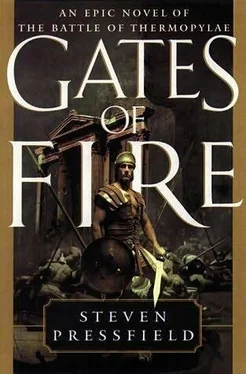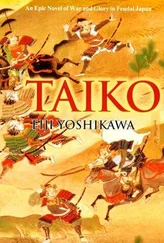Steven Pressfield - Gates of Fire - An Epic Novel of the Battle of Thermopylae
Здесь есть возможность читать онлайн «Steven Pressfield - Gates of Fire - An Epic Novel of the Battle of Thermopylae» весь текст электронной книги совершенно бесплатно (целиком полную версию без сокращений). В некоторых случаях можно слушать аудио, скачать через торрент в формате fb2 и присутствует краткое содержание. Жанр: Историческая проза, на английском языке. Описание произведения, (предисловие) а так же отзывы посетителей доступны на портале библиотеки ЛибКат.
- Название:Gates of Fire: An Epic Novel of the Battle of Thermopylae
- Автор:
- Жанр:
- Год:неизвестен
- ISBN:нет данных
- Рейтинг книги:3 / 5. Голосов: 1
-
Избранное:Добавить в избранное
- Отзывы:
-
Ваша оценка:
- 60
- 1
- 2
- 3
- 4
- 5
Gates of Fire: An Epic Novel of the Battle of Thermopylae: краткое содержание, описание и аннотация
Предлагаем к чтению аннотацию, описание, краткое содержание или предисловие (зависит от того, что написал сам автор книги «Gates of Fire: An Epic Novel of the Battle of Thermopylae»). Если вы не нашли необходимую информацию о книге — напишите в комментариях, мы постараемся отыскать её.
Gates of Fire: An Epic Novel of the Battle of Thermopylae — читать онлайн бесплатно полную книгу (весь текст) целиком
Ниже представлен текст книги, разбитый по страницам. Система сохранения места последней прочитанной страницы, позволяет с удобством читать онлайн бесплатно книгу «Gates of Fire: An Epic Novel of the Battle of Thermopylae», без необходимости каждый раз заново искать на чём Вы остановились. Поставьте закладку, и сможете в любой момент перейти на страницу, на которой закончили чтение.
Интервал:
Закладка:
To that end he attempted to make clear to the Greek the following:
That the physical desecration performed upon the corpse of Leonidas was regretted keenly by His Majesty almost as soon as He had ordered it. The actual command had been issued amid the grief of the batik's aftermath, when His Majesty's blood was raging over the loss before his own eyes of thousands, by some counts as many as twenty thousand, of the Empire's finest warriors slain by the troops of Leonidas, whose defiance of God Ahura Mazda's will could only be perceived through Persian eyes as an outrage against heaven. In addition two of His Majesty's own brothers, Habrocomes and Hyperanthes, and more than thirty royal kinsmen had been sent down to the house of death by the Spartan foe and their allies.
Moreover, the captain appended, the mutilation of Leonidas' corpse was, when viewed in the apposite light, a testament to the respect and awe in which the Spartan king was held by His Majesty, for against no other commander of the enemy had He ever ordered such extreme and, to Hellenic eyes, barbarous retribution.
The man Xeones remained unmoved by these arguments and repeated his desire to be dispatched at once. He refused all food and water. It seemed that the telling of his tale would be broken off here and not resumed.
It was at this point, fearing that the situation could not be kept from His Majesty much longer, that Orontes sought out Demaratos, the deposed king of Sparta residing within the court as a guest exile and advisor, and urged his intercession. Demaratos, responding, betook himself in person to the Royal Surgeon's tent and there spoke alone with the captive Xeones for more than an hour. When he emerged, he informed the captain Orontes that the man had experienced a change of heart and was now willing to continue the interrogation.
The crisis had passed. Tell me, the captain Orontes inquired, much relieved, what argument and persuasion did you employ to effect this turnabout?
Demaratos replied that of all the Hellenes the Spartans were acknowledged the most pious and held the gods most in awe. He declared it his own observation that in this regard among the Lakedaemonians, the lesser rankers and those in service, particularly the outlanders of the captive Xeones' station, were almost without exception, in Demaratos' phrase, more Spartan than the Spartans.
Demaratos had, he said, appealed to the fellow's respect for the gods, specifically Phoebus Apollo, for whom the man clearly evinced the most profound reverence. He suggested that the prisoner pray and sacrifice to determine, as best he could, the god's will. For, he told the fellow, surely the Far Striker has assisted your tale thus far. Why would he now order its discontinuance? Did the man Xeones, Demaratos asked, place himself above the immortal gods, presuming to know their unknowable will and stopper their words at his own whim?
Whatever answer the captive received from his gods, it apparently coincided with the counsel proposed to him by Demaratos.
We picked up the tale again on the fourteenth day of the month of Tashritu.
Polynikes was awarded the prize of valor for Antirhion. This was his second, achieved at the unheard-of age of twenty-four years. No other Peer save Dienekes had been decorated twice, and that not until he was nearly forty. For his heroism Polynikes was appointed Captain of the Knights; it would be his honor to preside over the nomination of the Three Hundred king's companions for the following year. This supremely coveted distinction, coupled with his sprinter's crown from Olympia, established Polynikes as a beacon of fame whose brilliance shone forth far beyond the borders of Lakedaemon. He was perceived as a hero of all Hellas, a second Achilles, who stood now upon the threshold of unbounded and undying glory.
To Polynikes' credit, he refused to become puffed up over this. If any swelling of the head could be discerned, it manifested itself only in a more fiercely applied self-discipline, though this zeal for virtue, as events were to tell, could spill over into excess when applied to others less spectacularly gifted than himself.
As for Dienekes, he had only been honored with inclusion in the company of Knights once, when he was twenty-six, and had declined respectfully all subsequent nominations. He liked the obscurity of a platoon commander, he said. He felt more himself among the ranks. It was his conviction that he could contribute best by leading men directly, and that only to a certain number. He refused all attempts to promote him beyond the platoon level. I can't count past thirty-six was his standard disclaimer. Beyond that, I get dizzy.
I will add, from my own observation, that Dienekes' gift and vocation, more so even than warrior and officer, was that of teacher.
As all born teachers, he was primarily a student.
He studied fear, and its opposite.
But to pursue such an excursus at this time would lead us astray from the narrative. To resume at Antirhion:
On the return passage to Lakedaemon, as punishment for accompanying Alexandras in following the army, I was removed from that youth's company and forced to march in the dust at the rear of the train, with the sacrificial herd and my half-helot friend Dekton. This Dekton had acquired at Antirhion a new nickname-Rooster-from the event that, immediately following the battle, he had delivered the thank-offering cock to Leonidas half-strangled in his own fists, so frenzied was he with excitement from the battle and his own frustrated desire to have participated in it. The name stuck. Dekton was a rooster, bursting with barnyard belligerence and ready to scrap with anything, his own size or three times bigger. This new tag was picked up by the whole army, who began to regard the boy as something of a good-luck talisman, a mascot of victory.
This of course galled Dekton's pride beyond even its accustomed bellicose state. In his eyes the name embodied condescension, yet another reason to hate his masters and to despise his own position in their service. He declared me a blockhead for following the army.
You should've flown, he hissed sidelong as we trudged in the choking flyblown wake of the train. You deserve every lash you get, not for what they blame you for, but for not drowning that hymn-singer Alexandras when you had the chance – and churning your shanks straight to the temple of Poseidon. He meant that sanctuary in Tainaron to which runaways could flee and be granted asylum.
My loyalty to the Spartans was rebuked with scorn and ridicule by Dekton. I had been placed in this boy's power shortly after fate had brought me to Lakedaemon, two years earlier, when both he and I were twelve. His family worked the estate of Olympieus, Alexandras' father, who was related to Dienekes via his wife, Arete. Dekton himself was a half-breed helot, illegitimately sired, so rumor had it, by a Peer whose gravestone, Idotychides in war at Mantinea lay along the Amyklaian Way, opposite the line of syssitia, the common messes.
This half-Spartiate lineage did nothing to advance Dekton's status. He was a helot and that was it.
If anything, the youths his age, and the Peers even more so, regarded him with extra suspicion, reinforced by the fact of Dekton's exceptional strength and athletic skill. At fourteen he was built like a grown man and nearly as strong.
He would have to be dealt with someday, and he knew it.
I myself had been in Lakedaemon half a year then, a wild boy just down from the hills and consigned, since it was safer than risking ritual pollution by killing me, to the meanest of farm labor. I proved such an infuriating failure at this that my helot masters took their complaints directly to their lord, Olympieus. This gentleman took pity on me, perhaps for my free birth, perhaps because I had come into the city's possession not as a captive, but of my own uncoerced will.
Читать дальшеИнтервал:
Закладка:
Похожие книги на «Gates of Fire: An Epic Novel of the Battle of Thermopylae»
Представляем Вашему вниманию похожие книги на «Gates of Fire: An Epic Novel of the Battle of Thermopylae» списком для выбора. Мы отобрали схожую по названию и смыслу литературу в надежде предоставить читателям больше вариантов отыскать новые, интересные, ещё непрочитанные произведения.
Обсуждение, отзывы о книге «Gates of Fire: An Epic Novel of the Battle of Thermopylae» и просто собственные мнения читателей. Оставьте ваши комментарии, напишите, что Вы думаете о произведении, его смысле или главных героях. Укажите что конкретно понравилось, а что нет, и почему Вы так считаете.












